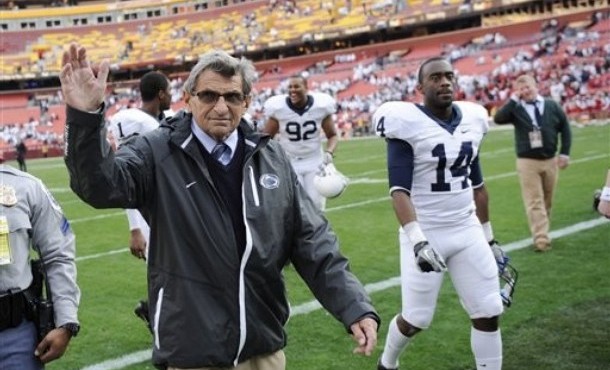The NCAA’s actions on Monday seem to be about more than just punishing Penn State’s future football teams for the school’s role in the Jerry Sandusky scandal.
In addition to the fines, bans and other sanctions they handed down that will hurt their storied program for a long time, in some eyes they have effectively and literally wiped out almost all of the success of teams under Joe Paterno starting the moment he learned about Jerry Sandusky’s actions but never did anything about it.
“Obviously, the 1998 date was selected because that’s when the first reported incidents of abuse occurred and that’s when the failure to respond appropriately began,” NCAA President Mark Emmert said during a news conference on Monday. “And that was the point of time from which one could make an argument, of course, that the failures began inside the institution, so it seemed to both me and the executive committee that that was the appropriate beginning date.”
Emmert’s message was clear: The NCAA was choosing to punish a culture of silence, a culture that protected the program above all moral obligations and those responsible for making it that way.
Vacating wins has long been a debate in all sports. And so there is no surprise that the NCAA’s ruling on Monday sent the debate over the decision to vacate the wins into a tailspin. But it raised questions about the implications the sanctions will have on past and current players, Joe Paterno’s legacy and ultimately Penn State’s place among the best football programs.
Some say you can erase the wins, but it is an empty punishment that does nothing to move the university forward and doesn’t ultimately change the facts. Others say it is the best way to punish a school, by wiping out a massive chunk of their storied history.
” Yes, Joe Paterno turned out to be a really bad person. But he won more games than any college coach in history. That’s a fact,” Forbes writer Mike Ozanian wrote. “Barry Bonds holds both the all-time and single season home run records in baseball. That’s a fact. We might not like either fact. But we should also be treated as mature and adult enough to be able to discern on our own the difference between sports heroes and villains.”
For the players on the impacted Penn State teams, taking away those 112 games means they have essentially become collateral damage to the institution they so proudly represented on the field, when they likely had no idea what was happening off the field. The 2005 team will argue that their one-loss season and Orange Bowl win cannot be erased.
Overheard: Who pays the price for sanctions?
Others argue the scars of their efforts still remain even if the win column looks different. Adam Taliaferro, a former player under Joe Paterno, tweeted about a plate in his neck that is a lasting reminder of his spinal cord injury from playing at Penn State.
[adrotate banner=”54″]

